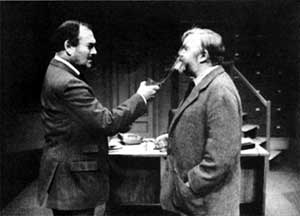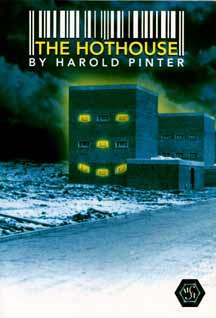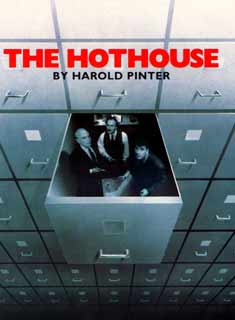
Harold Pinter and John Shrapnel
|
The Hothouse, Minerva Studio Theatre,
Chichester,
17 August - 9 September 1995, transferred to Comedy Theatre, London
September 1995
Roote - Harold Pinter
Gibbs - John Shrapnel
Lamb - Christien Anholt
Miss Cutts - Celia Imrie
Lush - Robert East
Tubb - Roland Oliver
Lobb - Peter Blythe
Directed by David Jones
Settings - Eileen Diss
Costume - Tom Rand
Lighting - Mick Hughes
Sound - Tom Lishman
Assistant Director - Joe Harmston
Give the man an exploding cigar
by Charles Spencer
Watching Harold Pinterís starring performance in his own play
The Hothouse, you realise that we lost a magnificent comic actor
when this former denizen of tatty reps transformed himself into
Britainís greatest living dramatist.

Programme Cover
|
The play itself reinforces the impression of recent
years that, although Pinterís pause-filled plays undoubtedly are
menacing, enigmatic, and all the other adjectives associated with
that handy word Pinteresque, he is, perhaps above all else, a wonderfully
funny writer.
I have a hunch that while he was establishing his reputation as
Ýan important dramatist,
Pinter and his directors deliberately played down his gift for gags,
concentrating instead on all that was murky, avant-garde and unsettling
in his work.
Which might be one reason why The Hothouse took so long to
see the light of day. He wrote it in 1958, shortly after The
Birthday Party, but then put it aside for more than 20 years
before giving his permission for a 1980 production at Hampstead,
which transferred to the West End.
Of course, this welcome revival has its serious side. It is set
in a sinister state institution, the precise function of which is
never quite explained. The inmates ñ whom we never meet - are described
as patients and referred to by numbers; thereís an interrogation
scene involving electrodes and white noise; and at the end we learn
that all the senior staff have been massacred by the residents.
It's impossible not to think of the psychiatric hospitals in which
totalitarian states lock up their dissidents.
Pinterís paranoid vision of malign government control had become
familiar to the point of clichÈ in the years since the play was
written. What keeps the piece fresh is edgy, brilliantly timed dialogue,
its confrontations between characters as they battle for territory
and control and its unashamed relish for jokes.
You may find this hard to credit, but in The Hothouse Pinter
works the old exploding cigar routine, not to mention a heroically
awful joke based on the phrase ëfor the love of Mikeí which might
give an end-of-the-pier comedian second thoughts.
Pinter himself is in glorious form as Colonel Roote, who runs the
institution. This bristly-moustached character ñ prone to sudden
intemperate rages, rather like the famously testy playwright himself
ñ is having a terrible Christmas Day. One of the inmates has died,
and another has given birth, with the suggestion that Roote might
be the father.
Basil Fawlty and Captain Mainwaring come to mind as Pinter blusters,
bullies, submits grotesquely to flattery and gradually lays bare
an authority figure that is losing control. The smiling menace with
which he inquires, ëBetween ourselves, man to man, youíre not by
any chance taking the old wee-wee out of me, are you?í is alone
worth the price of admission.
The supporting performances are impeccable. John Shrapnel is superb
as a blank-faced, creepy functionary; Celia Imrie is a slinky, smilingly
manipulative femme fatale; and Tony Haygarth is hilarious
as the insolent slob who rattles Roote.
David Jonesís production, ingeniously designed by Eileen Diss, never
relaxes its grip and there is a splendidly unsettling soundtrack
(Tom Lehman) featuring the whimpers and diabolical laughter of the
inmates.
Itís a memorable evening of menace-fuelled mirth, and Pinter, for
so long suspected of ingrained solemnity, must surely be a candidate
for the comedy performance of the year award.
The Daily Telegraph, 24th August 1995

Programme Cover - Comedy Theatre
|
Pinter ñ prince of comedy
by Ian Shuttleworth
One of the most remarkable things about seeing Harold Pinter act
in his own plays is that they generally brood much less when
he is around. The eloquent pauses and significant obliquenesses
are all in place, but Pinter understands the extent of the comedy
of his work.
Not that humour is difficult to spot in The Hothouse, which
he wrote in 1958 but ëset asideí until 1980, and now transfers from
Chichesterís Minerva Studio in David Jonesís fine production. The
shadows are all cast by the scheme of the play rather than its execution.
The setting of an undefined ërest homeí in which the inmates, known
only by numbers, are routinely abused and electronically tortured
by staff whilst the man in charge blusters inanely and his subordinates
jostle one another for the succession, offers pre-echoes of One
For The Road and Mountain Language. Yet the actual script
is less suggestive of Orwell or Kafka than of Orton.
As Roote, the ineffectual, pompous ëchiefí, Pinter sports both a
moustache and a manner reminiscent of Dadís Armyís Captain
Mainwaring. He makes an excellent self-important, retired colonel,
unable to string a sentence together at the best of times and gradually
subsiding into a whiskey haze while his accent becomes broader and
more plebeian.
Rooteís assistants, Giggs and Lush, are played with equal finesse
by John Shrapnel and Tony Haygarth. Shrapnel is a master of arid
assiduity, his face a careful blank but seemingly emitting a whir
of the turning cogs of a Machiavellian scheme. Haygarthís Lush is
sly, insinuating, greased with self-satisfaction as he riles his
superior, accusing him of impregnating patient 6459 and murdering
6457.
Lush is the agent of two moments of unimaginably broad un-Pinterian
comedy. Having twice had whiskey flung in his face for these allegations,
the third time he grabs Rooteís tumbler and twirls it above his
head in a galumphing balletic parody ñ later extracting Roote with
an exploding cigar. The mind boggles that Pinter ever wrote such
slap-stick, let alone between The Birthday Party and The
Caretaker.
As Miss Cutts, mistress of both Roote and Gibbs, Celia Imrie wears
a permanent cool smirk, obviously playing her own game throughout.
Christien Anholt is all naove idealism as Lamb, who is ultimately
sacrificed amid the electrodes of ënumber one interviewing roomí.
Even here the gags persist, as the disembodied voices of Gibbs and
Cutts hector him, ëHave you always been virgo intacta?í and ëWhat
is the law of the wolf pack?íThe play itself lacks a little polish:
introducing an entirely new character for the final five-minute
scene smells of dramatic desperation. In the end, though, its successes
are much more surprising than its flaws. On this occasion, Pinterís
famous ëweasel under the cocktail cabinetí is wearing a red nose
and clownís baggy trousers.
Financial Times, 5th October 1995
|




